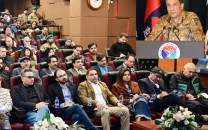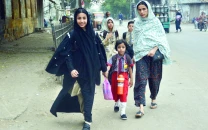Climate resilience starts with accountability
Social audits are not just about transparency

Northern Pakistan has witnessed a troubling surge in climate induced disasters over the past few years. From flash floods in Gilgit-Baltistan to landslides in Chitral, the region's fragile infrastructure is repeatedly overwhelmed. Roads are blocked, bridges swept away, and water channels disrupted, leaving communities isolated and vulnerable. Hundreds of precious lives have been lost to climate-related disasters recently all over Pakistan and many dozens out of them in G-B. Among the victims were several tourists who perished in the Babusar flash flood, as well as more than seven young men from the Danyore in Gilgit who were buried under debris while repairing a water supply channel damaged by flooding. While climate action is rightly gaining momentum, one critical area remains under addressed: the resilience and quality of public infrastructure.
The problem is not just the intensity of natural disasters but the poor quality of infrastructure that fails to withstand them. In many cases, roads and bridges collapse not solely due to the force of nature but because of substandard construction and lack of oversight. Communities often voice concerns about the durability of public works, but their voices rarely influence planning or implementation.
This is where civil society can play a transformative role. A compelling model comes from India's Mazdoor Kisan Shakti Sangathan (MKSS), a grassroots movement that pioneered the concept of social audits. Through public hearings known as jansunwais, MKSS enabled villagers to scrutinise government expenditures, verify the quality of public works, and hold officials accountable. The model was so effective that it became institutionalised in India's public sector rural development programmes.
Social audits are not just about transparency. They are about empowerment. They allow communities to participate in governance, ensuring that public funds are spent wisely and infrastructure is built to last. This model offers a promising blueprint for Pakistan, especially in regions like G-B where climate vulnerability is high and civil society is active.
G-B and Chitral is home to a network of Local Support Organisations (LSOs) and community-based groups fostered by the Aga Khan Development Network. These organisations have deep roots in local communities and a strong track record of mobilising people for development. They also possess valuable indigenous knowledge, understanding flood paths, water behaviour, and landscape dynamics that can significantly improve infrastructure design and implementation.
Imagine a system where every bridge, road or water channel built with public funds is subject to community oversight. Where local knowledge informs engineering decisions. Where civil society groups conduct audits, verify expenditures and ensure quality. This is a practical and scalable model that can begin with pilot projects in G-B and expand nationwide.
Such an approach would not only improve infrastructure resilience but also restore public trust in development processes. It would create a feedback loop where communities are not passive recipients of aid but active participants in shaping their future. And it would align with Pakistan's climate adaptation goals by ensuring that infrastructure investments are sustainable and responsive to local realities.
To make this happen, policymakers must recognise civil society as a partner in public infrastructure development. Legal frameworks should be introduced to institutionalise social audits. Funding mechanisms should support community-led monitoring. And development professionals must facilitate these processes with humility and openness.
The youth, especially in rural areas, have a vital role to play. With training and support, they can become auditors, mobilisers and monitors. Their involvement would not only strengthen accountability but also create employment and civic engagement opportunities.
Resilience is not just about stronger materials, but about stronger systems of accountability. Civil society-led monitoring offers a path forward that is democratic, effective and rooted in local knowledge.
Let G-B lead the way. Let Pakistan invest not just in infrastructure but in the people who will protect it.



















COMMENTS
Comments are moderated and generally will be posted if they are on-topic and not abusive.
For more information, please see our Comments FAQ